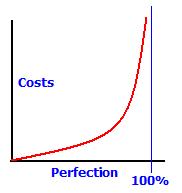Have you ever wondered what were your biggest mistakes in your professional career? Which things you should do another way or at least try to change? It’s usually easy to judge others, especially looking from a perspective of time. Hey, he shouldn’t have left the company then, because now he’d have been promoted at least twice. Easy to say, because it’s about him and you know exactly what happened during those two years after he left. Back then the decision probably didn’t look like a mistake.
With the same schema we can judge our own decisions, however it’s much harder. First, for most of us it’s difficult to accept that we actually made a mistake. Second, it’s even more difficult to be unbiased when you consider yourself and your own actions. Nevertheless it’s worth a try.
There’s one thing more – people usually tend to share with others their successes, not failures, so your own experience is even more precious – you have unlimited access to it. You won’t find a lot of “failure stories,” so I thought I’d share some of mine.
Personal interactions
 When I was leading a support team I had a couple of conflicts with developers partially based on personal background. I thought that if I’m so dedicated and if I struggle to do my best everyone should too. It’s not so hard to imagine that it was rather naive point of view (we worked in a corporation then). Instead of letting other managers to resolve the problem with their people I was making my private tiny war. E.g. we did some performance tests to prove that one of developers didn’t make optimizations, just to show he’d ignored the task. Why didn’t I ask him if he had done that and spent much time for useless tests? Bah, don’t ask me now. You should have asked me then. I can recall several similar situations, all of them having source in my personal likes/dislikes and resulting in, let’s say, not optimal business decisions.
When I was leading a support team I had a couple of conflicts with developers partially based on personal background. I thought that if I’m so dedicated and if I struggle to do my best everyone should too. It’s not so hard to imagine that it was rather naive point of view (we worked in a corporation then). Instead of letting other managers to resolve the problem with their people I was making my private tiny war. E.g. we did some performance tests to prove that one of developers didn’t make optimizations, just to show he’d ignored the task. Why didn’t I ask him if he had done that and spent much time for useless tests? Bah, don’t ask me now. You should have asked me then. I can recall several similar situations, all of them having source in my personal likes/dislikes and resulting in, let’s say, not optimal business decisions.
Building a team
 I was once a department director, building a team and a product from a scratch. By the way it was a great job. I think my biggest mistake then was too slow promotions within the team. For me it’s very hard to promote someone unless I’m completely sure she’s the right person. However I should overcome my resistance instead of waiting too long before official promotion for a couple of the leaders. Not mentioning that I didn’t even thought about potential successors of any of the leaders. Subconsciously I tried to direct my people through the way I passed once: first informal role of leader with real manager controlling whole team and then eventually getting own team and formal managerial role. Unfortunately, I and one of my colleagues changed the job leaving over a dozen of people with no junior and middle management. The promotions were soon carried out, but with people rather unprepared to managerial role and little supervising it wasn’t a vast success. Some time was wasted too.
I was once a department director, building a team and a product from a scratch. By the way it was a great job. I think my biggest mistake then was too slow promotions within the team. For me it’s very hard to promote someone unless I’m completely sure she’s the right person. However I should overcome my resistance instead of waiting too long before official promotion for a couple of the leaders. Not mentioning that I didn’t even thought about potential successors of any of the leaders. Subconsciously I tried to direct my people through the way I passed once: first informal role of leader with real manager controlling whole team and then eventually getting own team and formal managerial role. Unfortunately, I and one of my colleagues changed the job leaving over a dozen of people with no junior and middle management. The promotions were soon carried out, but with people rather unprepared to managerial role and little supervising it wasn’t a vast success. Some time was wasted too.
Communication with sales
 As a manager of operations team (development, implementations, quality assurance and project management team) my biggest mistake was poor contact with several sales people. I know there’s always a conflict between sales and development, but I’m far from thinking that the technical side is the one which is infallible. Quite the contrary, I even wrote that in general it’s better to have a business person as a CEO and sometimes having a geek as a leader of a company isn’t a great idea. I know all of that, but still I haven’t managed to be on good terms with few sales. And by now I still don’t see how I could get it done right with those people. I’m not even sure if it was possible. Maybe more time has to pass and I’ll find out the answer then. Maybe our characters are too different and we hadn’t even a chance. Nevertheless, the fact remains, it’s my failure too.
As a manager of operations team (development, implementations, quality assurance and project management team) my biggest mistake was poor contact with several sales people. I know there’s always a conflict between sales and development, but I’m far from thinking that the technical side is the one which is infallible. Quite the contrary, I even wrote that in general it’s better to have a business person as a CEO and sometimes having a geek as a leader of a company isn’t a great idea. I know all of that, but still I haven’t managed to be on good terms with few sales. And by now I still don’t see how I could get it done right with those people. I’m not even sure if it was possible. Maybe more time has to pass and I’ll find out the answer then. Maybe our characters are too different and we hadn’t even a chance. Nevertheless, the fact remains, it’s my failure too.
Choosing an idea
 I was working with my friend on a piece of software. Whole thing was intended as a micro-ISV idea, but none of us decided to leave everyday job. In this case our biggest mistake was choosing an application we worked on. It’s not about a market for the application – I still believe we had a chance. It’s about our attitude – we had little fun while working on the software we’d chosen and we reached the point where none of us was still motivating himself, not mentioning about motivating a partner. The software died unfinished. We’d chosen the application only because some of work (part of the code) was already done, so we thought it’ll take much less work to finish. Now I think we had about 5% of work completed, so the choice wasn’t a well-thought one.
I was working with my friend on a piece of software. Whole thing was intended as a micro-ISV idea, but none of us decided to leave everyday job. In this case our biggest mistake was choosing an application we worked on. It’s not about a market for the application – I still believe we had a chance. It’s about our attitude – we had little fun while working on the software we’d chosen and we reached the point where none of us was still motivating himself, not mentioning about motivating a partner. The software died unfinished. We’d chosen the application only because some of work (part of the code) was already done, so we thought it’ll take much less work to finish. Now I think we had about 5% of work completed, so the choice wasn’t a well-thought one.
Depending on situation my mistakes were followed by different consequences – in the first situation results were negligible, in the last example whole initiative ended up as a failure. It’s just a bunch of examples, but I can think about a list of others based on both my experience and my observations. Generally, it’s not shame to err – making a mistake once is an occasion to learn, but making the same mistake twice becomes a stupidity.













